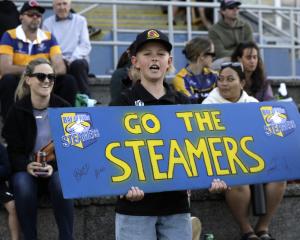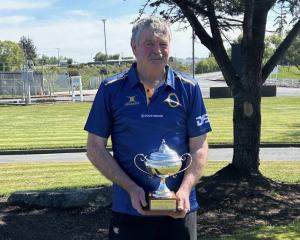The full statements of apology issued by the New Zealand Rugby Union (NZRU) and South African Rugby Union (SARU).
NZRU acting chairman Mike Eagle and chief executive Steve Tew
"2010 is a year in which the New Zealand Rugby Union (NZRU) and New Zealand Maori Rugby Board (NZMRB) wish to honour all players of Maori descent and especially those who have worn the New Zealand Maori jersey over its proud 100 years history.
"The centenary activity has also prompted rugby to revisit and wrestle with the hurt caused by our sporting contact with South Africa during the years that black and other South Africans were subject to the oppression of apartheid.
"The issues generated by apartheid and the sporting connections which existed at that time affected our two countries deeply and had an enormous impact over several decades, to the extent that those effects are still being felt today.
"Among those affected were Maori players in New Zealand teams invited to South Africa and today we extend a genuine apology to all of those players, coaches and administrators affected, as well as their families and other communities who were impacted directly or indirectly by our organisation's decisions in response to South Africa's apartheid policies at those times.
"The NZRU first set out to consider this issue in 2009 as we prepared for the centenary of New Zealand Maori in 2010 and believed it was right to ask for advice from the New Zealand Maori Rugby Board.
"The NZMRB's advice was that an apology might have the effect of unfairly condemning past Maori administrators and that it was more appropriate to focus on the present and the celebration of the New Zealand Maori centenary year.
"However, we acknowledge the steps taken by the South African Rugby Union and by the South African Minister for Sport and Recreation in response to these issues.
"We recognise the very difficult situation that our predecessors were faced with, including those members of the NZMRB, the NZRU council and administration and, indeed selectors, coaches and players, during that time.
"We also acknowledge that throughout the apartheid era some of the decisions were taken with good intentions, which included protecting Maori players from insult and vilification. We acknowledge the complexities of the issues that they faced and today's apology is not intended to be a criticism of those involved at that time.
"Today, on behalf of the New Zealand Rugby Union, we wish to say sorry first and foremost to those Maori players who were not considered for selection for teams to tour South Africa or to play South Africa.
"We apologise to the families of those players and to the wider Maori community who were affected directly or indirectly by the decisions taken to not include Maori players for those teams and tours. It was a period in which the respect of New Zealand Maori rugby was not upheld and that is deeply regretted.
"We also wish to take the opportunity to apologise to New Zealand as a whole for the division that rugby's contact with South Africa caused across the country over many years.
"It is our desire that rugby remains a game that unifies and inspires New Zealanders. Similarly, we share the aspiration of the New Zealand Maori Rugby Board that Maori rugby remains strong and continues to contribute positively to Maori communities and to the development of our game.
"We hope today's expression will contribute to this and will allow everyone within rugby, and particularly those supporters of Maori rugby, to celebrate the best traditions of Maori rugby during this year's centenary activities.''
SARU president Oregan Hoskins
"The debate in New Zealand around the non-selection of Maori players for tours of South Africa prompted considerable discussion within our union.
"A number of Maori rugby players became innocent victims of the racist ideology of our former government, a policy that oppressed the daily lives of all black South Africans.
"Those policies also denied thousands of talented black sportsmen and women the opportunity to compete for selection for South Africa's national sports teams.
"As the current guardians of the game of rugby union it is therefore appropriate that we take this opportunity to apologise to those Maori players who may have been excluded from selection and to the offence this may have caused to the Maori community.
"But, even more importantly, this is the opportunity to apologise on behalf of rugby to black South Africans who were denied the opportunity to represent not only their country but also their provinces throughout those long dark years because of the connivance of our predecessors in the systematic suppression of the majority.
"We also acknowledge that there were white players who identified with the struggle for non-racialism and who suffered as a result of the international ban.
"The current South African Rugby Union came into being in 1992 as the first governing body representative of all South Africans. We have striven to cast off the shadow of rugby's racially divisive past since then. This acknowledgement of the mistakes of our predecessors and apology for our sport's culpability is another step in attempting to lift that shadow."






